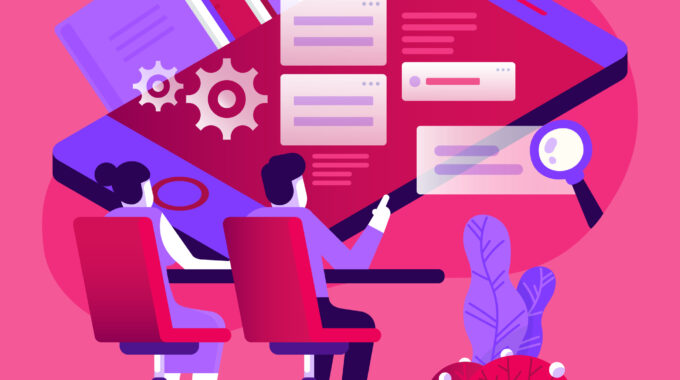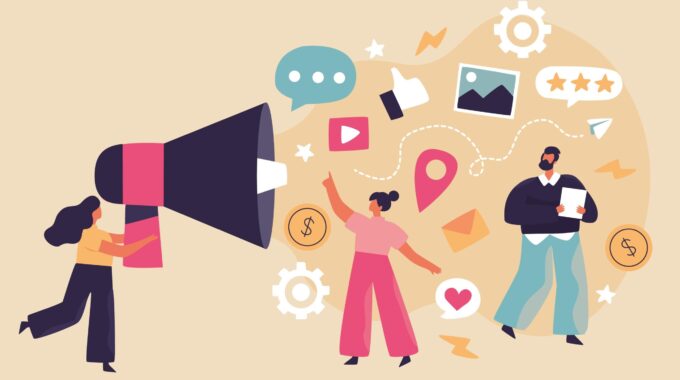Custom Software Development is the profession of building software with a functionality that is specific for…

Marketing Automation in B2B
Introduction
Marketing automation is transforming the B2B (business-to-business) landscape and providing businesses with a sophisticated set of tools and strategies to reach their desired audiences and accelerate revenue growth. B2B companies are now able to communicate with clients on a more personal level. They are able to expedite several marketing procedures thanks to the integration of automation, analytics, and personalisation. In this article, we’ll discuss the basic concepts of marketing automation and how B2B businesses can leverage it to drive growth.
What is Marketing Automation?
Marketing automation is the practice of automating common marketing processes to deliver more efficient and personalized communication with customers. A company can improve crucial procedures like analytics, lead creation, landing page optimisation, email marketing, and lead generation by utilising automation. B2B businesses can have a continuous, successful, and personalised digital interaction with clients by automating these operations.
How Does Automation Help B2B Businesses?
By leveraging automation, B2B companies can ensure that marketing messages reach the right customers at the right time. This ensures minimizing costly manual processes and freeing up valuable resources.
Automation enables B2B companies to:
- Grow their customer base and accelerate revenue growth by targeting the right audiences with the right message
- Gather customer data and analyze it in real-time to identify buying trends, customer preferences, and other insights that can inform decision-making
- Reduce operational costs by automating marketing processes like email list segmentation and customer outreach.
- Optimize website conversions by optimizing each step of the customer journey
Automation can also give B2B businesses the information and insights they require to decide on their product and service offerings. By understanding a customer’s personality and preferences, companies can tailor offers and campaigns to reach their target audience more directly.
Best Practices for B2B Marketing Automation
The following best practises for B2B businesses should be kept in mind to maximise the ROI of marketing automation:
1. Leverage Customer Insights: To maximize the effectiveness of automation, start by gathering customer data and leveraging it to build a comprehensive customer persona. This includes data collected across multiple channels, including web, social media, email, and other platforms. This data can then be used to segment customers and tailor marketing messages and campaigns for each group.
2. Create Automated Nurturing Programs: Using automation, design focused sequences that nurture leads and prospects into becoming customers after you’ve established a customer persona. Automated nurture programmes should contain information that is appropriate for each segment. It should be personalised for each stage of the customer’s journey.
3. Monitor Performance: As you build out your automated campaigns, make sure to monitor performance and track key metrics like open rates, click-through rates, and conversion rates. This will enable you to identify successes and opportunities for improvement.
4. Personalize Communications: Automation can help you personalize your communications for each segment. This includes personalizing messages with the customer’s name, company, and other contextual information. Personalization can lead to higher open and conversion rates. It shows that you’re paying attention to your customers’ needs and wants.
5. Test and Optimize: As with all aspects of digital marketing, continuous testing and optimization is key to finding success with marketing automation. Experiment with different content, email sequences, and segmentations to find the right mix for your organization and your audience.
Conclusion
By leveraging the power of automation, B2B businesses can boost their marketing efficiency and reach more customers. With a combination of customer insights, automated programs, and personalization, B2B companies can ensure they’re delivering the right message to the right audience and have the data to back up their decisions. While it can take some time to set up the right programs and processes, the results can be well worth the investment.
About Apoorva:
Apoorva is a technology services company that assists software products with ideation, developing prototypes, programming, creating a digital marketing presence and accelerating sales through direct contact. Over 150 for-profit and non-profit organizations, such as Xcel Energy, PeopleCare Health Services, Frontier Airlines and Centers for Spiritual Living have trusted Apoorva to build software.
Apoorva was founded in 2001, has more than 50 employees, and uses proprietary and proven methodologies to bring technology products to the market. Contact us / Visit apoorva.com for more information.




